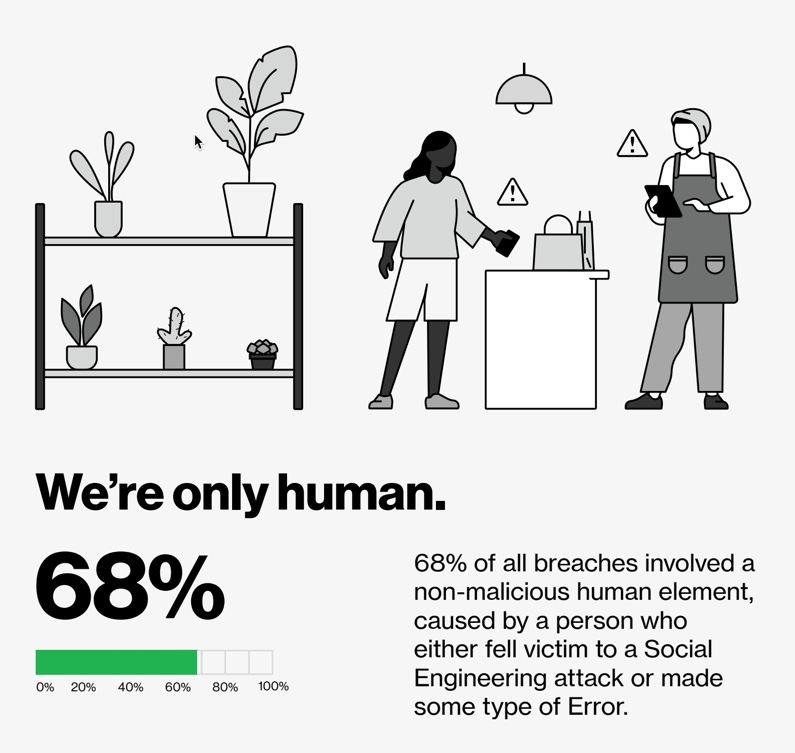Strategies to Prevent Data Breaches for Small Businesses
The Ultimate Guide to Preventing Data Breaches for Small and Medium Businesses
In today’s interconnected world, data breaches are no longer a concern exclusive to large corporations. Small businesses are increasingly targeted, often because attackers perceive them as having weaker defenses. According to a report by Verizon, 43% of cyberattacks target small businesses (Source: Verizon 2024 Data Breach Investigations Report). Despite this alarming statistic, many small business owners believe they are too small to be targeted, leaving them vulnerable to costly attacks.
This blog explores the nature of data breaches, common vulnerabilities, and practical strategies to prevent data breaches for small and medium businesses.
Image source: Verizon 2024 Data Breach

What is a Data Breach?
A data breach occurs when sensitive, confidential, or protected information is accessed or disclosed without authorization. For SMBs, this could mean exposing customer records, financial information, or proprietary business data.
Common consequences include:
- Financial Loss: The average cost of a data breach for small businesses is $4.88M, according to a 2024 report by IBM (Source: IBM Cost of a Data Breach Report).
- Reputation Damage: Loss of customer trust can result in decreased revenue and long-term business setbacks.
- Legal Implications: Non-compliance with data protection regulations can lead to hefty fines.
Concerned about IT Risks?
We’ll help you spot the gaps before they become problems.
Why Are Small Businesses Targeted?
Small businesses often lack the resources to implement strong cybersecurity measures, making them easy prey for cybercriminals. Key reasons include:
- Weaker Security Infrastructure: Many SMBs lack firewalls, encryption, or regular system updates.
- Human Error: Employees unaware of cybersecurity best practices often fall victim to phishing scams.
- Valuable Data: Small businesses handle sensitive customer and financial data, which is highly lucrative on the black market.
Common Types of Data Breaches Affecting SMBs
- Phishing Attacks
Cybercriminals use deceptive emails to trick employees into revealing sensitive information. These attacks account for over 36% of all data breaches, according to the Verizon report. - Ransomware
Attackers encrypt business data and demand payment for its release, often crippling operations. - Insider Threats
Current or former employees with access to sensitive information can intentionally or unintentionally cause data breaches. - Software Vulnerabilities
Outdated software creates entry points for hackers to exploit.
Strategies to Prevent Data Breaches for Small and Medium Businesses
1. Employee Training
Human error is a leading cause of data breaches. Conduct regular training sessions to educate employees on recognizing phishing emails, safeguarding passwords, and following cybersecurity best practices.
Pro Tip: Implement phishing simulations to test employees’ awareness and improve response to potential threats.
2. Use Strong Password Policies
Weak or reused passwords are a significant vulnerability. Ensure all employees:
- Use complex passwords with a mix of characters.
- Enable multi-factor authentication (MFA) wherever possible.
- Avoid sharing passwords across platforms.
One breach can ruin everything—don’t wait to find out.
Protect your business before it’s too late.
3. Keep Systems Updated
Outdated software often contains exploitable vulnerabilities. Regularly update operating systems, antivirus programs, and other critical software.
Quick Tip: Enable automatic updates to ensure timely patching of vulnerabilities.
4. Implement Data Encryption
Encrypt sensitive data, both at rest and in transit, to protect it from unauthorized access. Even if attackers gain access to the files, encryption renders the data useless without the decryption key.
5. Invest in Managed IT Services
SMBs can benefit from partnering with managed IT service providers, like Verity IT, to enhance their cybersecurity posture. These providers can implement and monitor security protocols, identify vulnerabilities, and provide expert guidance.
6. Backup Data Regularly
Ensure regular, automated backups of critical business data to minimize downtime and data loss in the event of a breach.
7. Create an Incident Response Plan
Prepare for the worst by having a documented incident response plan. This should outline the steps to take in the event of a breach, including:
- Identifying the breach source.
- Notifying affected parties.
- Collaborating with IT experts to mitigate damage.
The Role of Cybersecurity Policies
Establishing a robust cybersecurity policy is essential for every SMB. This policy should cover:
- Acceptable use of company systems.
- Guidelines for handling sensitive data.
- Steps for reporting suspicious activities.
Key Takeaways
- Data breaches are a significant threat to small businesses, but they can be mitigated with proactive strategies.
- Investing in employee training, strong password policies, and managed IT services can significantly reduce vulnerabilities.
- Regular backups and a solid incident response plan can help minimize damage in case of a breach.
By implementing these strategies, small and medium businesses can strengthen their defenses and protect their data from unauthorized access.
Get Started with Managed IT Services Today!
